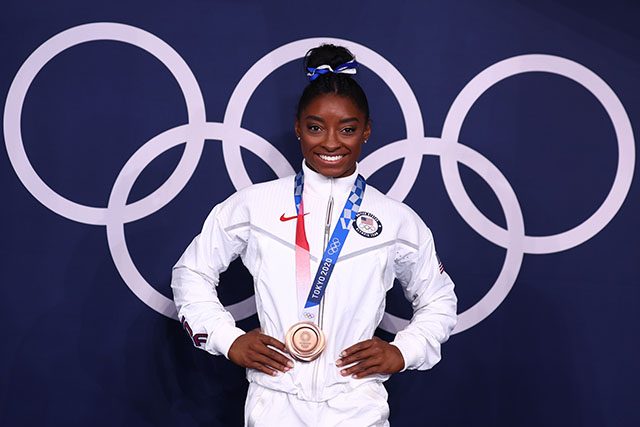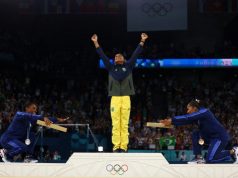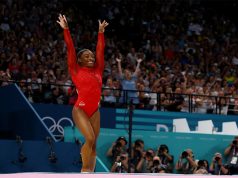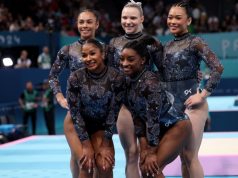
TOKYO — Simone Biles made a fearless return to competition on Tuesday, capping a tumultuous Tokyo Games with a bronze medal on the balance beam and then using the Olympic stage to remind everyone that athletes are human beings.
The final gold of the women’s artistic gymnastics program would go to China’s Guan Chenchen with a score of 14.633 and the silver to her compatriot Tang Xijing but it was Biles who grabbed the spotlight for her courageous comeback.
“I was proud of myself just to go out there after what I’ve been through,” said Biles, who arrived in Tokyo having already won four golds and a bronze in Rio five years ago.
“This one is definitely sweeter. I’ll treasure this one a lot more after everything I have been through.”
While still dealing with the traumatic events of the past week, Biles did not rule out returning to the Olympic stage in three years for the 2024 Paris Games.
“I have to process this Olympics before I think about Paris,” said Biles, who owns a combined 32 Olympic and world championship medals.
“Right now I’m going to focus on myself a little bit more often rather than push stuff under the rug.”
Three times a world champion on the beam, Biles might have finished third but her mere presence in the final was considered a victory after she abruptly dropped out of last Tuesday’s team competition—where she failed to complete the planned number of twists in her vault—citing mental health issues.
The 24-year-old came to Tokyo eyeing a record haul of six golds, which would have made her the most successful female Olympian of all-time across any sport, but instead suffered a crisis of confidence that led to her withdrawing from the all-around, vault, asymmetric bars and floor exercise finals.
Biles explained later she was dealing with the “twisties” — a type of mental block where gymnasts get disoriented during their gravity-defying sequences.
It was that pressure and expectation that appeared to derail Biles’ Olympics and she spoke with remarkable candor about her decision to prioritize her mental and physical well-being.
“Mentally I still have a lot of things that I have to work on but to bring the topic of conversation on mental health to light means the world to me,” said Biles, who was widely applauded for putting athlete mental health in the Olympic spotlight.
No idea
“People have to realize that at the end of the day we’re humans, we’re not just entertainment. There are things going on behind the scenes that people have no idea about.”
But if there was any lingering apprehension when Biles entered the arena for her final shot at a medal, it did not show as she blew kisses to the television cameras.
After a hug from her coach and a quick intake of breath, it was back to work as Biles stepped up to the beam with a look of determination.
With billions of viewers transfixed on Biles as she mounted the 10cm-wide apparatus, she did not waver as she began to showcase a number of complex skills with a triple spin in the squat position.
But as she prepared to get ready for her dismount, everyone held their breath, willing the American to make a safe landing.
Before she arrived in Tokyo, Biles had spent hours perfecting a double twisting, double back dismount from the beam—and unsurprisingly she did not attempt that combination on Tuesday.
What she did pull off was a double-piked somersault dismount— and when she landed that safely, roars could be heard around the arena, in Tokyo and probably the rest of the world.
She broke out into a huge smile and clutched her heart as soon as she completed her routine before performing a delightful jig. The prolonged tight embrace she then shared with her coach summed up the huge relief they were both feeling.
Her performance was clearly not the normal perfection expected from a gymnast billed as the greatest of all-time but was fearless in its execution.
The third of eight competitors to perform, Biles’ mark of 14.000 did not look as if it might be enough for a place on the podium but in the end, the only one to leapfrog the American would be the last one to compete—Guan.
When the final scores appeared, Biles celebrated by first embracing her teammate Sunisa Lee, who had claimed the all-around crown earlier in the competition.
“I didn’t expect a medal today I just wanted to go out there for me and that’s what I did,” said Biles, who had also picked up a bronze on the apparatus in Rio. “I dedicate this all Team USA for helping me and reaching out and it meant the world.”
The bronze was the second medal Biles picked up at the Tokyo Games, to go along with the silver she shared in the team event.
The two medals bring her Olympic total to seven.
The women’s beam final was sandwiched between the men’s parallel bars and horizontal bar finals.
Twice parallel bars world champion Zou Jingyuan secured gold for China on the apparatus for the third time in four Games with a score of 16.233, finishing ahead of Germany’s Lukas Dauser.
Japan also finished on a golden high when all-around champion Daiki Hashimoto added to his haul with a win on the horizontal bar to close out the competition. — Reporting by Steve Keating; additional reporting by Chang-Ran Kim and Elaine Lies; Editing by Pritha Sarkar









